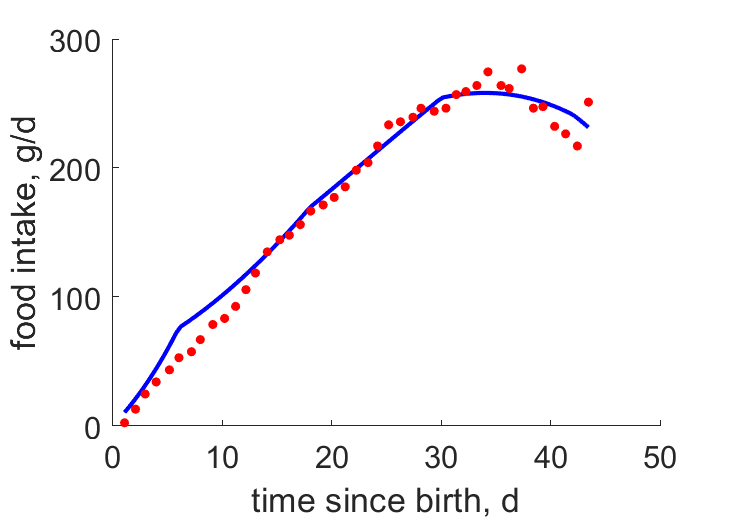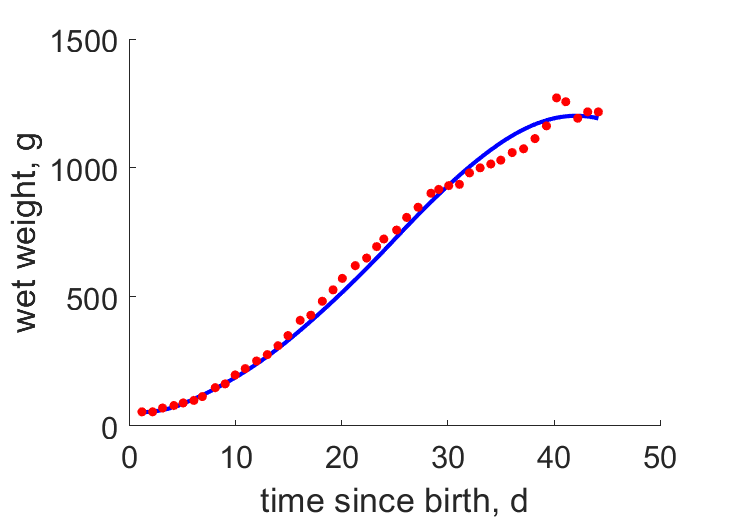Predictions & Data for this entry
| Model: std | climate: Cfa, Dfa | migrate: Ml | phylum: |
| COMPLETE = 2.7 | ecozone: THp | food: biCi, biCvf, biCva | class: |
| MRE = 0.024 | habitat: 0iFm, 0iFe | gender: Dg | order: |
| SMSE = 0.001 | embryo: Tnpfm, Tnsfm | reprod: O | family: |
Zero-variate data
| Data | Observed | Predicted | (RE) | Unit | Description | Reference |
|---|---|---|---|---|---|---|
| ab | 28 | 28.64 | (0.02279) | d | age at birth | ADW |
| tx | 45 | 45.22 | (0.004898) | d | time since birth at fledging | ADW |
| tp | 135 | 134.6 | (0.002764) | d | time since birth at puberty | guess |
| tR | 1095 | 1095 | ( 0) | d | time since birth at 1st brood | ADW |
| am | 9417 | 9670 | (0.02682) | d | life span | AnAge |
| Wwb | 54.2 | 53.77 | (0.007869) | g | wet weight at birth | XiLu2001 |
| Wwi | 1900 | 1908 | (0.004309) | g | ultimate wet weight | avibase |
| Ri | 0.02055 | 0.02082 | (0.01342) | #/d | maximum reprod rate | XiLu2001 |
Uni- and bivariate data
| Data | Figure | Independent variable | Dependent variable | (RE) | Reference |
|---|---|---|---|---|---|
| tJX |  | time since birth | food intake | (0.05678) | XiLu2001 |
| tW |  | time since birth | wet weight | (0.04443) | XiLu2001 |
Pseudo-data at Tref = 20°C
| Data | Generalised animal | Nipponia nippon | Unit | Description |
|---|---|---|---|---|
| v | 0.02 | 0.02821 | cm/d | energy conductance |
| p_M | 18 | 1174 | J/d.cm^3 | vol-spec som maint |
| k_J | 0.002 | 0.04616 | 1/d | maturity maint rate coefficient |
| k | 0.3 | 0.2884 | - | maintenance ratio |
| kap | 0.8 | 0.926 | - | allocation fraction to soma |
| kap_G | 0.8 | 0.7987 | - | growth efficiency |
| kap_R | 0.95 | 0.95 | - | reproduction efficiency |
Discussion
- mod_1: v is reduced
- mod_2: Pseudo-data point k is used, rather than k_J; Data set tp and parameter t_R are added, the latter replacing clutch interval t_N. Postnatal T is based on PrinPres1991, see get_T_Aves. See further the revision page, theme puberty
Bibliography